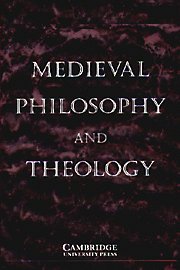No CrossRef data available.
Article contents
Aquinas’s Abstractionism
Published online by Cambridge University Press: 16 May 2002
Abstract
According to St. Thomas, the natures of material things are the proper objects of human understanding.Thomas claims only that the natures of things are the proper objects of the intellect, not that they are its only objects: he does not deny that we have intellective cognition also of the contingent states and situations of particular material things. And he holds that, at least in this life, humans cognize these natures, not through innate species or by perceiving the divine exemplars, but only by abstraction from phantasms (ST Ia, 84.7, 85.1).This claim applies to the exercising of concepts already acquired, as well as their initial acquisition (ST Ia 84.7). Here and throughout, I use “cognition” to translate “cognitio.” As Scott MacDonald (“Theory of Knowledge” in Cambridge Companion to Aquinas, ed., N. Kretzmann and E. Stump [Cambridge: Cambridge University Press, 1993], p. 162) points out, translating “cognitio” with “knowledge” is misleading, given that cognitiones can, on Thomas’s account, be false (see, for example, ST Ia 17.3). I discuss Aquinas’s conception of cognition in section I.1. More precisely, the human intellect’s active component, the agent intellect, produces cognition of the natures of material things by abstracting intelligible forms from phantasms and informing them on its passive component, the possible intellect, to actualize the latter’s potency to understand.This division of the intellect into an active and a passive component originates in Aristotle’s cryptic remark that in the soul “there is a mind for becoming all things” and “a mind for producing all things” (DA III 5, 430a10). This passage has been subject to myriad interpretations. Aristotle’s Arabic commentators read him as saying that (one or both) of these intellects are single and separate from individual human souls. In opposition to these interpretations, Aquinas holds that the agent and possible intellects are both immanent powers of each individual soul. Since these interpretations enjoyed considerable popularity in Aquinas’s day, we often find him developing his account of the human intellect in explicit opposition to them (cf. OUIAA). The aim of the present piece is to clarify Thomas’s account of this intellective abstraction, and thereby the precise force of the conceptual empiricism it asserts.Important recent work by several scholars has advanced our understanding of many central aspects of Aquinas’s philosophy of mind and epistemology, including his account of intellective abstraction. See Eleonore Stump, “Aquinas on the Foundations of Knowledge,” Canadian Journal of Philosophy (Supplementary Volume) 17 (1992); “Aquinas’s Account of the Mechanisms of Intellective Cognition,” Revenue Internationale de Philosophie 52 (1998): 287–307; “Aquinas on Sensory Cognition,” in Medieval Analyses in Language and Cognition, eds. Sten Ebbesen and Russell L. Friedman, volume 77 in the series Det Kongelige Danske Videnskabernes Selskab, Historisk-Filosofiske Meddelelser (Copenhagen: Munksgaard, 1999), pp. 377–395. Norman Kretzmann, “Infallibility, Error, and Ignorance,” Canadian Journal of Philosophy 17 (1992); Kretzmann, “Philosophy of Mind,” in Cambridge Companion to Aquinas; Robert Pasnau, Theories of Cognition in the Later Middle Ages (Cambridge: Cambridge University Press, 1997); and Scott MacDonald (“Theory of Knowledge,” in Cambridge Companion to Aquinas).Many of these discussions share a salutary focus on Aquinas’s claims regarding the reliability of our faculties, so that their treatments of intellective abstraction tend to center on his prima faciae wildly implausible claim to its infallibility: “The proper object of intellect is the quiddity of a thing, and this is why intellect is not fallible regarding the quiddity of a thing, speaking of it just as such” (ST Ia 85.6). Kretzmann provides an interesting and detailed treatment of this claim. Drawing on a range of texts, he argues that the intellect’s apprehension of the quiddity of a thing is such that one acquires an initial, crude concept of that thing, and that this apprehension must be distinguished from the intellect’s act of compounding, in judgments, the aspects of things so apprehended: it is only through a fallible, and extended process of making such judgments that we arrive at more adequate concepts of things (see the final section of “Infallibility, Error, and Ignorance”). MacDonald also makes insightful, and complementary, observations along similar lines (pp. 183–84). However, though helpful, these points do not suffice to explain, let alone render defensible, Thomas’s claim of infallibility: why can’t some of our acts of intellective abstraction yield false cognitions (however rudimentary), in the sense Thomas specifies?; in other words; why can’t the agent intellect sometimes produce in the possible intellect forms which do not correspond to the forms that actually inhere, or even could inhere, in material things? I think that Stump is right to take this optimism to be one striking instance of Thomas’s general epistemic optimism rooted in his conviction that God designed our cognitive faculties (Stump, “Foundations of Knowledge,” pp. 145–48).The interpretation of his intellective abstraction provided here complements Stump’s insight. For it, in effect, elaborates how Aquinas’s theistic metaphysics grounds his epistemic optimism about the first operation of our intellect. In particular, it explains how the agent intellect, as the human participating likeness in the divine light of understanding, has the active potency to order phantasms in such a way that it can produce in the possible intellect intelligible species which are determinate likenesses of the particular material things of which we have experience (cf. Section III iv, below). Examining his distinction between sensible and intellectual cognition, and his account of the way the former, in phantasms, supplies the data for intellective abstraction, will lead us to reassess the nature of Thomas’s antinativism—arguably the most important historical and philosophical legacy of his cognitive psychology.
- Type
- Research Article
- Information
- Copyright
- © 2001 Cambridge University Press




